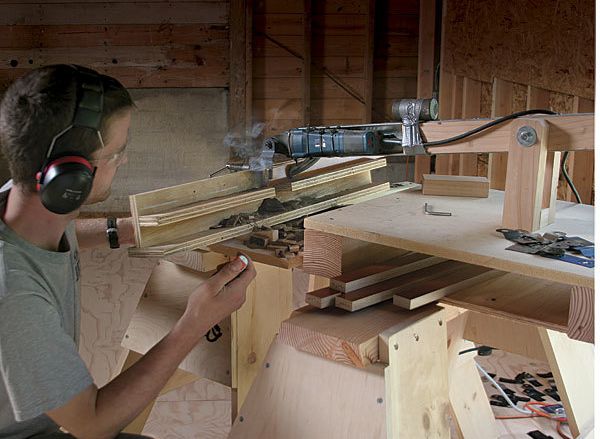Torture Test: Multitool Blades
Clean, fast cuts shouldn't cost a fortune.

Synopsis: For many years, Fein had cornered the market on multitool blades. When its patent expired, however, the door opened for competition. In this torture test, senior editor Justin Fink examines blades from 13 manufacturers to see which ones hold up best. After the testing, three stood out: a Bosch blade, a Fein blade, and a Versa-Tool blade. Reviews of all blades tested are available with this article.
For nearly two decades, Fein had the market for oscillating multitool blades pretty well cornered. Knockoffs were sold by a few companies, and tipsters offered ways to fabricate homemade blades. For the most part, though, Fein was the only game in town.
To make matters worse, Fein knew that we needed them — that if we were plugging in that MultiMaster, whether for an accurate plunge cut or a delicate flush cut, it was because no other tool could get the job done. So, often grumbling about blown profit margins, we ponied up the $50 or so for a three-pack of blades that, adding insult to injury, often wore out at a disappointing pace.
The blade game has changed
Since Fein’s patent on the MultiMaster expired, the oscillating-multitool market has expanded to include more than a dozen different brands. The number of companies making multitool blades also has grown, in many cases beyond the brands of tools themselves. We’re not just choosing among the familiar brands like Fein, Bosch, and Dremel, but independent, sometimes small, sometimes online-only blade retailers. In short, the power of choice is back in the hands of the buyer. But with that choice come more questions: Who makes the best blades? Is this low-cost blade from an online retailer really a bargain once you factor in the shipping cost?
Multitool blades come in lots of flavors, from coarse- to fine-tooth, plunge-cut to segmented (half-round shape), and even carbide- and diamond-tipped. For this review, we focused on bimetal blades, which are offered by all 12 brands and are intended for cuts in wood and metal. Each of the blades is between 1 1⁄8 in. and 1 3⁄4 in. wide, with a depth of cut between 1 1⁄8 in. and 1 3⁄4 in. Although we didn’t test other types of blades, we hope that the results of the bimetal-blade evaluation will serve as an indicator of the overall quality and performance of each brand.
How we tested
To eliminate the possibility of the results being skewed from our bearing down on the tool during a cut, we built a counter-weighted armature that was balanced so that only the weight of the oscillating multitool — about 4 lb. — and a very minor downward pressure were driving the blade through the wood.
The mounting design of each blade is a bit different, and though there is some cross compatibility among brands, no multitool accepts every brand of blades. We thought it was more important to keep the tool constant, so we used the corded Bosch Multi-X tool because its wide, flat mounting surface made it easy to cinch down blades securely, even those that didn’t fit perfectly. It wasn’t a setup that toolmakers are likely to endorse, but it’s probably done on a daily basis on job sites.
For more photos and details, click the View PDF button below:
Fine Homebuilding Recommended Products
Fine Homebuilding receives a commission for items purchased through links on this site, including Amazon Associates and other affiliate advertising programs.

Handy Heat Gun

Reliable Crimp Connectors

Affordable IR Camera


















